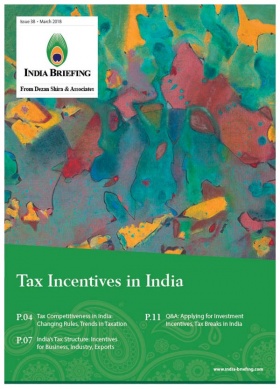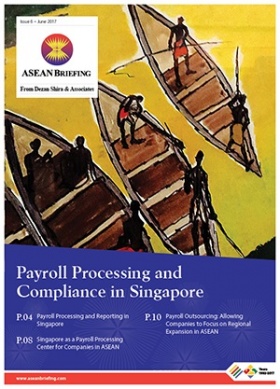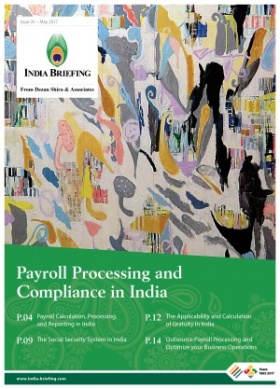Why Singapore is a Hub for Indian Businesses
India’s Prime Minister Narendra Modi made a three day official visit to Singapore late last month. The trip was his first since November 2015, and followed quick visits to Indonesia and Malaysia.
The three-nation tour, touted to be part of India’s Act East Policy, laid clear emphasis on closer Southeast Asian trade and business ties.
The bilateral visit touched on discussions surrounding defense, space, and skill development as well as attracting greater investments from Singapore-based companies.
Modi also attended an India-Singapore Enterprise event organized by Enterprise Singapore, a government body promoting the establishment of companies in Singapore.
Regional hub for Indian businesses
The interaction with the owners of Indian businesses assumes significance as an estimated 8,000 Indian companies have registered in Singapore since 2000.
Large business groups in India set up holding companies in Singapore to manage their Asian and international investments; the country is an international financial center and provides easier financing and refinancing schemes.

Singapore FDI into India
According to the Department of Industrial Policy and Promotion (DIPP) – foreign direct investment (FDI) inflows from Singapore contributed 17 percent of the total FDI in India since 2000.
This includes investments made by domestic companies as well as Singapore registered entities, most of which are regional operations of Indian firms.
Data from Singapore, on the other hand, shows the FDI inflow to be half this estimate – it does not include investments routed through holding companies based in the country.
Moreover, Singapore calculates its overseas investment based on a minimum 10 percent direct ownership of shares or voting power by a Singapore investor.
Major sectors in India that receive FDI inflow from Singapore are: financial services, telecommunications, drugs and pharmaceuticals, computer software and hardware, and trading. The balance – about 48 percent – comprise sectors not clarified by the DIPP.
Singapore-India tax treaty, trade pact
To reduce tax liabilities and improve trade flows, both countries have a Double Taxation Avoidance Treaty (DTAA); India and Singapore signed the Comprehensive Economic Cooperation Agreement (CECA) in 2005 and Singapore is also party to India’s trade agreement with ASEAN.
The DTAA targets shell companies to prevent tax evasion and the CECA offers tariff reduction on select products exported from Singapore to India.
Modi’s latest trip followed announcement of further reduction in tariffs and other trade relaxations by Singapore’s Ministry of Trade and Industry.
Indian companies registered in Singapore
Several Indian startups, although operating in India, have registered holding companies in Singapore to benefit from increased funding opportunities, business and tax friendly environment, and stable economic policies.
One of these companies is Flipkart, an e-commerce company that is registered in Singapore as Flipkart Private Limited (FPL).
Founded in 2007, it was registered in Singapore in 2011 as India did not permit 100 percent FDI in the online retail of multi-brand goods and services. This policy was amended in January 2018.
ZipDial (mobile marketing), InMobi (mobile advertising), Capillary Technologies (software products), and Tonbo Imaging (defense) are among several Indian startups that have recently registered in Singapore.
In addition to startups and large business groups, Singapore serves as a hub for several international trading and logistics companies due to its strategic location, excellent shipping connectivity, and low cost trade financing.
For example, Mercator, a large Indian shipping company, registered its coal, dry cargo, and offshore business in Singapore in 2015.
Singapore’s incentives for foreign companies
Singapore functions as a gateway for Indian companies expanding their trade and investment into ASEAN as it is, both, an international financial center and a shipping and aviation hub for the Asia-Pacific.
Here we lay out key incentives promoting Indian investments into the Singapore economy.
- India’s corporate tax rate for companies with an annual turnover of more than US$36.95 million (Rs 250 billion) is 30 percent, a reduction of four percent from 2011. Meanwhile, the current corporate tax rate in Singapore is much lower at 17 percent.
- Hiring local talent in Singapore is not compulsory, the government of Singapore pays half the salaries of national employees. This lowers the operational costs of firms registered in the country.
- Singapore has no export duty. Unlike India, import duties are limited to tobacco, petroleum products, and specific luxury goods.
- India taxes long term capital gains at 10 percent for investments over US$1,556.74 (Rs 100,000) but Singapore has no capital gains tax.
- For startups, India offers tax exemptions for firms incorporated in 2016 – for three years over a seven year period; discussions are in place to extend this benefit. Only if the profits of the startup (accessing the tax break) exceed US$3.7 million (Rs 25 crores) in a financial year, is it liable to pay tax for that year. However, Singapore offers a guaranteed three-year tax exemption for entities with an annual income of US$223,382 in their initial years.
- Singapore does not implement retrospective taxes, which can be a concern for investors looking at India.
About Us
India Briefing is published by Asia Briefing, a subsidiary of Dezan Shira & Associates. We produce material for foreign investors throughout Eurasia, including ASEAN, China, Indonesia, Russia, the Silk Road, & Vietnam. For editorial matters please contact us here and for a complimentary subscription to our products, please click here.
Dezan Shira & Associates provide business intelligence, due diligence, legal, tax and advisory services throughout India and the Asian region. We maintain offices in Delhi and Mumbai and throughout China, South-East Asia, India, and Russia. For assistance with India investment issues or into Asia overall, please contact us at india@dezshira.com or visit us at www.dezshira.com.
- Previous Article India’s World Cup Fever, New Sports Leagues Open Market Wide for Business
- Next Article Industrial IoT in India: Niche Market Grows on the Back of Domestic Demand















